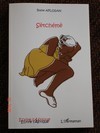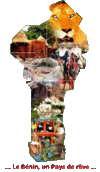Image

18 novembre 2013
17 novembre 2013
09 novembre 2013
21 octobre 2013
13 octobre 2013
08 septembre 2013
07 septembre 2013
04 septembre 2013
03 septembre 2013
29 août 2013
22 août 2013
15 août 2013
13 août 2013
07 août 2013
01 août 2013
30 juillet 2013
28 juin 2013
20 juin 2013
16 juin 2013
14 juin 2013
13 juin 2013
12 juin 2013
11 juin 2013
09 juin 2013
07 juin 2013
06 juin 2013
04 juin 2013
03 juin 2013
02 juin 2013
31 mai 2013
30 mai 2013
28 mai 2013
27 mai 2013
26 mai 2013
25 mai 2013
23 mai 2013
22 mai 2013
21 mai 2013
19 mai 2013
18 mai 2013
16 mai 2013
12 mai 2013
05 mai 2013
Les notes récentes
- Pour un Bénin Intègre, Dynamique et Juste : JaY 2016!
- Front Pour la Responsabilisation des Acteurs Publics: JYPPE 2016
- Bénin : Portrait Robot du Président en 2016
- 3 juil 2015 13:59:58
- France : A chacun son Egungun
- Tweet du Jour : Si « Institutions Complices » Veut dire Instrumentalisation, Alors c’est Raté
- Après Soro, Bientôt Hitler ou Pol Pot Pourront être Faits Dah à Titre Posthume au Bénin, ex-Danhomè
- Investiture de Me Adrien Houngbédji : Effet Critique d'un Discours de Sagesse
- Le Tweet du Jour : Soglo et son Numéro Gascon
- Monarchies, Rites et Temps : Tout Change et Rien ne Change
Holdup 2 Yayi !
- Holdup2Yayi
Jours
se sont écoulés
depuis le holdup
odieux perpétré par la bande des pilleurs diri gée par Yayi, valet-zombie de
la Françafrique
en terre du Bénin
Pages
- Archives & Catégories
- BABILOWN : BEST OF
- Babilown Essai 1
- Babilown Essai 2
- Babilown Essai 3
- Chronologie du royaume gun de Hogbonu
- Cliquer sur l'une des images ci-dessous pour accéder aux notes récentes
- Dix Instruments de Musique Béninois
- Dixit : Ils ont dit
- Etudes Dahoméennes 1
- Financement des partis politiques : Cas de la France et du Nigeria
- Flash-back sur le Tandem HOUNGBEDJI/LEHADY
- Haïku/Hovikléhoun
- HOMMAGE AU ROI GBÊHANZIN HÉROS NATIONAL
- La Haine de soi Dahoméenne en Chansons
- Le Livre Blanc sur l'Union Fait la Nation
- Les Dictateurs Africains
- Les Pensées de Blaise P., Intégrale
- Les Racines d'Obama
- LES TRIBULATIONS DU ROI KPOYIZOUN
- Liste des Députés
- Listes des Gouvernements Successifs du Président Yayi Boni de 2006 à 2010
- Où va le Bénin ?
- Page Philo 1 : Existentialism
- Pour l'Histoire /Consensus Mémoriel et Vérité Historique : Toffa et Béhanzin dans la Conscience Collective
- Pour l'Histoire : PRINCE SERGE AGBODJAN ; TÂCLES ET CONTRE-ATTAQUES CONSTITUTIONNELLES
- Pour L'HISTOIRE : COUP D’ETAT DU 26 OCTOBRE 1972 et AFFAIRE COVACS : Le Roman Crépusculaire de Pascal Chabi Kao
- Pour l'HISTOIRE : Le Roman Crépusculaire de Chabi Kao : Antoine Robert DETCHENOU Répond et Fait la Lumière
- Pour l'Histoire/LOUIS HUNKANRIN 1886 - 1964 : A DAHOMEYAN NATIONALIST ?
- Pour l'Histoire/LOUIS HUNKANRIN 1886 - 1964 : A DAHOMEYAN NATIONALIST ?
- Pour l'Histoire/LOUIS HUNKANRIN, le Nelson Mandela du Dahomey
- POUR LHISTOIRE/ Louis Hunkanrin, une Vie de Combat pour la Liberté.
- Supplique de Maria-Valentina, in Le Journal de Ouanilo
- The Raven/Le Corbeau, Edgard Allen Poe
- èmawolè-bienvenue
- ékpé
BeninInfo
Recherche
avril 2016
SETCHEME
SONGHAÏ
GO Benin
Technorati
Bénin-Tourisme
- Bénin-To
Catégories
- Actualité (81)
- Archives (8)
- Article (117)
- Bannière (32)
- Baro (3)
- BD (1)
- Bestof (2)
- Billet (37)
- Bio (1)
- Blogs (1)
- Brèves (1)
- Cinéma (6)
- concept (5)
- Cont-ext (282)
- Critique (148)
- Definitio (6)
- Diary (7)
- Dico (4)
- Docu (2)
- Dossier (25)
- Débat (30)
- Editorial (38)
- Essai (538)
- Ethic (11)
- Facto (6)
- Feedback (7)
- Fiction (140)
- haro (367)
- haïku (358)
- histo (228)
- hommage (127)
- humor (102)
- Idéo (456)
- Ilzondi (369)
- Image (379)
- Info (14)
- Interview (37)
- Jeux (2)
- Lecture (77)
- Lettre (97)
- Litté (249)
- Livravou (6)
- Livres (23)
- Media (3)
- Memory (153)
- Movies (248)
- Musique (109)
- novel (1)
- o'thentic (4)
- obituary (1)
- Onzeweb (2)
- Openculture (1)
- Pamphlet (505)
- Petites annonces (2)
- philo (1)
- porque (194)
- Press Link (86)
- Press Links (1252)
- Pub (289)
- Question & S (8)
- Recap7 (11)
- Religion (20)
- Repub (11)
- Santé (3)
- Science (28)
- Sensas (13)
- sketch (21)
- Sports (8)
- telex (12)
- Tou8 (333)
- Trad (178)
- télex (3)
- Télévision (3)
- Vif (3)
- Vox (9)
- Voyages (1)
- Weblogs (1)
- Witness (1)
- Y'en-a-marre (1)
- Émoiémoi (1)
- àTrad (86)
- étude (24)
Billet d'Afrique et d'Ailleurs
France Tv-Radio
France Tv-Radio
► Europe 1
► Radio France
► France Info
► RFI
► Arte
► BFM-TV
► BFM-Radio
► CNN
► Euronews
► France 2
► France 3
► France 24
► RFO
► Plein d'autres...
► Zapping du PAF
Soumbala Bénin-Livre
Langues Africaines
Le Chemin d'Agoué
Cour Constit.
Archive.Org
Libre Savoir
Sika-Info
IciLomé
Vacance à Biarritz
GNGWANE
AFRICAPHONIE
Charles Darwin
CVRA
O'BAOBAB
O-BAOBAB
Noces du Caméléon
CS-FDD-INFO
Bénin Mains Propres
Stand Up For Africa
- Stand Up For Africa
Babilown Acro
Blog de
Aplogan
Blaise
Intransigeant
Libre
Original
Woofer
National
African Studies
MUSEE D'ABOMEY
SOSEKI : 夏目漱石
- SOSEKI : 夏目漱石
Mon amour a la couleur de la nuit Couleur des ténèbres Que vient visiter la lune
Global Voice
Le Kiosque
SOCIOLINGO
ODULAND
Catégories
- Actualité
- Archives
- Article
- Bannière
- Baro
- BD
- Bestof
- Billet
- Bio
- Blogs
- Brèves
- Cinéma
- concept
- Cont-ext
- Critique
- Definitio
- Diary
- Dico
- Docu
- Dossier
- Débat
- Editorial
- Essai
- Ethic
- Facto
- Feedback
- Fiction
- haro
- haïku
- histo
- hommage
- humor
- Idéo
- Ilzondi
- Image
- Info
- Interview
- Jeux
- Lecture
- Lettre
- Litté
- Livravou
- Livres
- Media
- Memory
- Movies
- Musique
- novel
- o'thentic
- obituary
- Onzeweb
- Openculture
- Pamphlet
- Petites annonces
- philo
- porque
- Press Link
- Press Links
- Pub
- Question & S
- Recap7
- Religion
- Repub
- Santé
- Science
- Sensas
- sketch
- Sports
- telex
- Tou8
- Trad
- télex
- Télévision
- Vif
- Vox
- Voyages
- Weblogs
- Witness
- Y'en-a-marre
- Émoiémoi
- àTrad
- étude
ÉTÈWUTU.com
- ETEWUTU.com
 Pourquoi ceci ? Pourquoi cela ? Tout ce que vous avez envie de savoir sur et autour du Bénin ... Osez le demander à ÉTÈWUTU.com
Pourquoi ceci ? Pourquoi cela ? Tout ce que vous avez envie de savoir sur et autour du Bénin ... Osez le demander à ÉTÈWUTU.com
Blog de Benoît Illassa
Regard sur le Bénin
Café Pédagogique
DICO-HISTOIRE
Pierre Bourdieu
Philo 24 h
Open Culture
Anazie
ADJAVIO
Canal U
Babelfeeds
Garde-Mots
Grandiose Parlor
Nigeria News Headlines
- Nigeria News Headlines
Ghana News Headlines
- Ghana News Headlines
Benin News Headlines
- Benin News Headlines
Béninculture
- Béninculture
Nelson Mandela Digital Archive
- Nelson Mandela Digital Archive
La Maison de l'Afrique
Solah Georgina Blog
- Solah Georgina Blog
Babilown Mawolè
Sowole Arts Blog
- Sowole Arts Blog
Google Ana
- Google Ana
art-BIVNZE
Pambazuka
- Pambazuka News
Passeur 2 Sciences
- Passeur 2 Sciences







Les commentaires récents